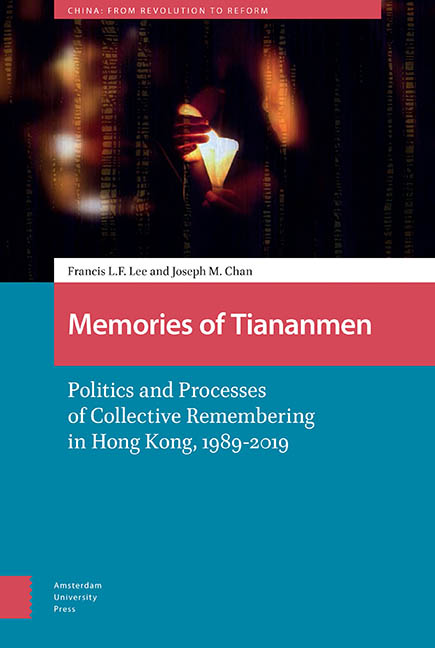Book contents
- Frontmatter
- Contents
- List of Figures and Tables
- Acknowledgments
- List of Abbreviations
- 1 Introduction
- 2 Memory Formation and the Valorization of Commemoration
- 3 Memory Mobilization
- 4 Intergenerational Memory Transmission
- 5 The Struggle for Memory Institutionalization
- 6 The Challenge of Localism and Memory Repair
- 7 Changing Attitudes toward Tiananmen?
- 8 Digital Media and Memory Balkanization
- 9 Conclusion
- Epilogue
- Appendix
- References
- Index
8 - Digital Media and Memory Balkanization
Published online by Cambridge University Press: 16 July 2022
- Frontmatter
- Contents
- List of Figures and Tables
- Acknowledgments
- List of Abbreviations
- 1 Introduction
- 2 Memory Formation and the Valorization of Commemoration
- 3 Memory Mobilization
- 4 Intergenerational Memory Transmission
- 5 The Struggle for Memory Institutionalization
- 6 The Challenge of Localism and Memory Repair
- 7 Changing Attitudes toward Tiananmen?
- 8 Digital Media and Memory Balkanization
- 9 Conclusion
- Epilogue
- Appendix
- References
- Index
Summary
Abstract
Chapter 8 discusses the impact of digital media on collective memory. The chapter examines both the positive and negative impact of digital and social media. On the one hand, the analysis notes how digital media provided the channels for memory mobilization and the archives for memory transmission. On the other hand, the analysis examines the problematics of memory balkanization. It explicates how political forces have shaped the development of digital and social media in Hong Kong and how competing representations of the Tiananmen Incident and commemoration activities are articulated and reinforced within distinctive memory silos.
Keywords: digital media, memory archive, memory balkanization, Polarization
When the Tiananmen crackdown occurred in 1989, most people in the world had probably not even heard of the Internet. The popularization of Internet technologies would come a few years later. By the 30th anniversary of “Tiananmen,” people were living in a fully digitalized world. Hong Kong, in particular, has one of the highest levels of Internet penetration and social media use in East Asia (Lee et al., 2017). One cannot fully understand the dynamics of collective remembering in the contemporary world without considering the influence of digital media platforms.
Scholars have identified numerous ways through which digital media have altered collective remembering. Digital media platforms facilitate the production of archives (Jensen, 2016), thereby making various kinds of historical records more readily accessible to people. In addition, digital media provide the space within which people engage in commemorative practices. This can alter what is being remembered, who can initiate collective remembering, and who can participate in remembrance and how (Harju, 2015; Rik, Ansgard & Marcel, 2018). More specifically, by adding their own input to the online pool of stories, experiences, historical knowledge, and amateur media products, the role of ordinary people has changed from relatively passive participants in elite-led activities to active contributors to commemoration (Lee, 2014; Liew, Pang & Chan, 2014). People can sometimes engage in diverse interpretations of a past event (Rantasila et al., 2018). In authoritarian contexts, social media even have the potential to empower people by allowing the expression of otherwise suppressed experiences and knowledge, thereby constructing new and critical versions of historical memories (Hillenbrand, 2020; Liu, 2018; Zhao & Liu, 2015)
- Type
- Chapter
- Information
- Memories of TiananmenPolitics and Processes of Collective Remembering in Hong Kong, 1989–2019, pp. 253 - 288Publisher: Amsterdam University PressPrint publication year: 2021



